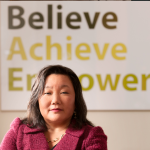Create, Empower and Change

A firm believer in the power and potential of all girls and young women, Jeannette Pai-Espinosa assumed leadership of The National Crittenton Foundation (TNCF) in January of 2007. Jeannette brings to this 130-year-old institution more than thirty years of experience in advocacy, education, intercultural communication, public policy, strategic communication, program development, and direct service delivery.

Photo courtesy of Jeannette Pai
Jeannette began her career as a vocal advocate and activist for issues of importance to girls and women in the early seventies, working to open doors and address gender bias. Today, she leads TNCF, which is the national umbrella for the 27 members of the Crittenton family of agencies, which provides services in 31 states and the District of Columbia. Crittenton agencies provide a comprehensive mix of gender and culturally responsive, trauma informed and specific, developmentally appropriate, strength-based services to girls and young women who are survivors of multiple forms of adverse childhood experiences. Services are provided in a range of settings from residential to in-home and community based.
Prior to coming to The Foundation, Jeannette was a partner for nearly ten years at Metropolitan Group, an award-winning social change agency specializing in serving social-purpose organizations and businesses. Much of her work focused on creating collaborative approaches to compelling social issues such as poverty, racial and gender disparities in educational outcomes, the disproportional representation of children and youth of color in the child welfare and juvenile justice systems, and bias crimes. She is currently; vice chair of the National Foster Care Coalition, a member of the Advisory Board for the National Girls Institute and a member of the Board of Directors of the Human Rights Project for Girls. Jeannette holds a master’s degree in student development and education administration. She and her husband are the parents of four “grown” children ages 27–34.
ALIST Columnist Svetlana Kim speaks with Jeannette about the work she does with TNCF and her passion for bringing to light the stories of female survivors of childhood trauma and violence.
1. You lead the National Crittenton Foundation, which is the national umbrella for 27 members of the Crittenton family agencies for girls and young women who live on the margin of the American Dream. Many are young single mothers who tend to live in rural areas. What is your vision for next five years?
This year marks the 130th anniversary of the social justice work founded by Charles Crittenton and Dr. Kate Waller Barrett. Today, we support essentially the same population of girls, young women and women that we did in the late 1800’s. While I think it’s great to have this kind of legacy, I also believe it calls on us to look at why more progress has not been made in advancing the needs and potential of girls and young women impacted by violence and trauma. To that end, we’ve just changed our mission statement to better reflect where we are headed the next 5 years. The new statement is: The National Crittenton Foundation advances the self-empowerment, health, economic security and civic engagement of girls and young women impacted by trauma and violence.
Crittenton and others have spent a lot of time addressing symptoms without digging deeper to address root causes like racism, sexism, poverty, etc. So the vision for the next five years is to ensure that we are simultaneously mitigating symptoms like teen pregnancy while also attacking root causes like racism and sexism. Additionally, in five years our hope is that the general public as well as decision and policy makers understand that there is a silent epidemic of violence against girls and young women in the USA. People are anxious to talk about and take action to stop violence against girls in developing countries, and yet they shy away from the situation in this country. Much of our work is dedicated to elevating the voices and experiences of survivors of childhood trauma and violence.
2. What are the challenges in this economic environment for TNCF, and what are the opportunities?
We face the same challenges as every other nonprofit in the country – finding the resources to continue the work. While we are 130 years old, we weren’t engaged in actively raising funds until 2008, which was not the time to get started. We are approaching development work on all fronts: online direct mail, etc. Additionally, the invisibility of the marginalized girls and young women who Crittenton supports makes it difficult to mobilize and activate people and organizations – we’ve come a long way in seven years but we still have much more work to do. I believe that the challenges are also opportunities to spread the word, educate and provide opportunities for people and organizations to get engaged once they learn about the needs and potential of young women survivors. All of the girls and young women we support across the country are survivors of childhood adversity and violence. They are involved with the child welfare, juvenile justice and homeless and runaway youth systems. Many are young mothers and far too often they are domestically trafficked for sex. Issues like addiction, mental health needs and poverty exacerbate the challenges they face.
In the context of all of these challenges they are amazingly resilient, persistent, courageous and hopeful – they are the opportunity buried underneath the challenges.
3. The foundation was established in 1883. What is the culture at the TNCF? What is the secret to the Crittenton’s success?
National Crittenton and the Crittenton agencies were founded on social justice foundation, which includes the belief that women deserve the same opportunity to achieve their potential regardless of the situations into which they were born. The culture is grounded in mutual respect, justice, compassion, authenticity and transparency.
At Crittenton, we believe that a person’s future should not be determined by their past. We know that with the right opportunities and support, girls and young women survivors can heal, break destructive cycles and transform their lives. TNCF’s goals are to ensure that every girl and young woman survivor of childhood trauma and violence can BELIEVE in her ability to succeed and thrive; ACHIEVE long-term health and economic security; EMPOWER herself, becoming a force for change. Our guiding principles are to: have relentlessly high expectations; honor the family (whatever it looks like); instigate change in communities, nurture girls and young women, shift the power dynamic and expose the truth; connect people to each other and build bridges; be a silo buster and open doors; respect survivors as leaders and partners; seek out unlikely partners; and drill down to root causes.
4. How did you balance your career and raising four children?
It was a balancing act all the time, and it was a partnership between my husband and I. As the children got older they too were part of making it all work out. In retrospect, it went very fast but I do recall many nights, days and weeks that were pretty intense. Being organized, having a flexible work schedule and a sense of humor was key too. In many ways you just have to put your head down, set incremental goals, use lists to keep things straight, and keep moving. I always worked full-time so early mornings before everyone woke up and evenings after everyone was in bed were times I could get work done. It was like dancing and juggling all the time, but I wouldn’t trade it for anything. Today, they are 28, 30, 32, and 34 – it hardly seems possible. I think you have to learn to take things in stride, and you need to believe that you’re doing the very best you can even if things aren’t perfect – I guess this means accepting that we are human and fallible at the same time we’re are unique and exceptional.
5. Would you share a few pearls of wisdom with our readers and how you found your purpose?
Interesting question – I’m lucky to have had parents who were very clear about what they stood for. So I was raised with positive role models who just helped people when they needed it. As first-generation immigrants they always supported those who came after them. I recall as a child when my father was working on college campuses every holiday we would have very diverse gatherings of students, staff and faculty that were in this country alone. Add to this the fact that I was a kid and teen during the 60’s and 70’s during the civil rights and women’s movement when the world was all about change, giving back and social responsibility. I started college in 1975 and was very active on campus as an advocate for women’s needs, human rights and more. So I actually always knew my life would be dedicated to supporting the empowerment of those who are invisible and marginalized. I also clearly understood that my work had to align with my core values. Again, I believe that this came from watching my parents as well as leaders of the time who were making their own sacrifices to make the world a more just place.
6. Who is your hero?
My heroes would have to be my parents. I wouldn’t have always said that because I think relationships between parents and their children are complicated. I think it’s particularly challenging for immigrant families because you have cultural dynamics in addition to the more routine tension between parents and kids. My grandparents also were models in different ways that helped to shape the way I see the world.
7. What’s your motto?
Walk the talk and nothing less.





